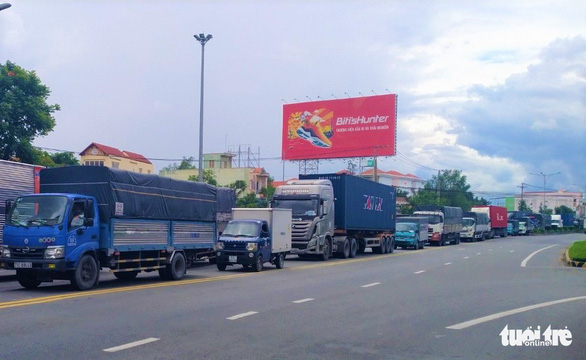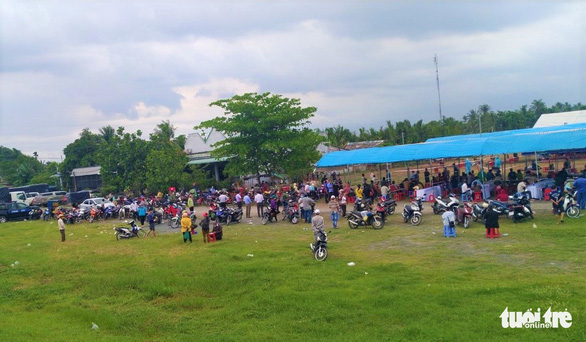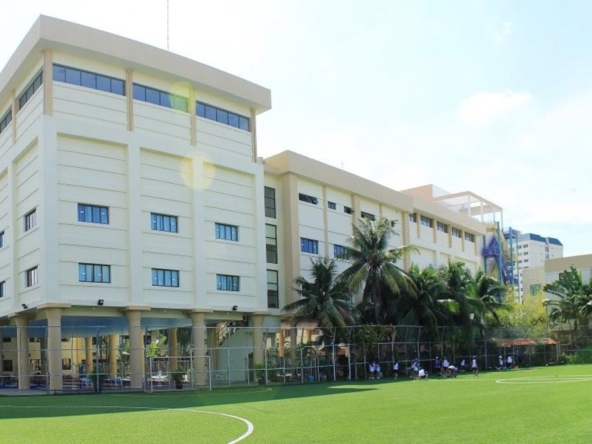Droves of motorbikes, cars, and trucks formed a long line on the road

Domestic immigrants from Mekong Delta localities sought to flee Ho Chi Minh City in droves on Thursday in order to shun the extensive social distancing measures that will be in place for 15 days from Friday, causing crowding and traffic jams on many major routes.
Severe congestion was seen on the Rach Mieu Bridge, which connects the Mekong Delta provinces of Tien Giang and Ben Tre, according to the observation of Tuoi Tre (Youth) newspaper reporters.
The traffic started to increase on the bridge since Wednesday afternoon, when the social distancing measures were announced, but traffic jams did not occur until Thursday, said Ha Ngoc Nam, deputy director of BOT Rach Mieu Co. Ltd., the firm managing toll fee collection on the bridge.
The congestion partly stemmed from the inadequate processing capability at the checkpoint for COVID-19 testing certificates that all drivers from Ho Chi Minh City are asked to present if they want to cross the bridge.
The southern city, which hosts a large number of migrant workers from across the country, has become the gravest outbreak site in Vietnam with 9,895 patients recorded since the fourth wave broke out in late April.
The alarming situation has prompted authorities in surrounding provinces to mandate negative COVID-19 test results for all drivers from the area.
Droves of motorbikes, cars, and trucks formed a long line on the road leading to the Rach Mieu Bridge for hours.
Waiting in a car in the midst of that queue, Nguyen Thi Ngoc Ha, 46, who hails from Ben Tre Province, said she wished to leave Ho Chi Minh City for her hometown before the restrictions, which require all non-ensential businesses to be closed and unecessary travels to be penalized, set in on Friday.
|
|
| This image shows people and vehicles along the road leading to the Rach Mieu Bridge, which connects Tien Giang with Ben Tre in Vietnam, July 8, 2021. Photo: M.T. / Tuoi Tre |
“My son and I will leave for my hometown for a while, while my husband will stay in the city for work,” she said.
“We will return to Ho Chi Minh City when the pandemic wanes.
“Although traveling during this time requires us to go through stringent protocols, I still have to do it for my son, as living isolated in Saigon is much worse than it is in the countryside.”
Addressing the congestion issue, deputy director Nam said he had informed local authorities and were waiting for their responses.
On Thursday, the Ben Tre People’s Committee directed relevant departments and agencies to prepare for the reception of people returning from Ho Chi Minh City.
Entrants from the southern metropolis who came from isolated zones or were identified as direct contacts of confirmed transmission cases would be subject to concentrated quarantine on arrival, according to Ben Tre regulations.
Those from other regions of Ho Chi Minh City or people identified as indirect contacts would have to undergo 14 days of self-isolation at home, with three COVID-19 tests slated for the first seven days.
At noon on Friday, the ministry confirmed 609 new COVID-19 cases, including 100 domestic and nine imported infections, of which 479 were detected in Ho Chi Minh City.
The latest infections have taken the country’s tally to 25,419 cases, including 8,950 recoveries and 105 deaths, since early 2020.
Since April 27, when the pandemic’s fourth wave erupted in Vietnam, the country has documented 21,943 infections.








